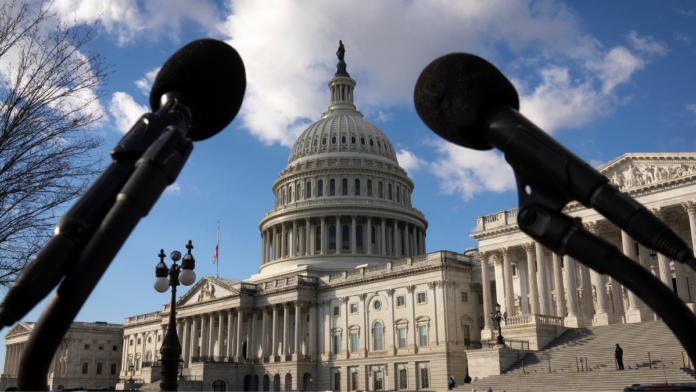America’s energy industry has been dealt a severe blow by the COVID-19 pandemic, accompanying shutdowns, and an international price war that sent oil prices to record lows.
On Capitol Hill, lawmakers are trying to determine the path forward through the recovery process, a debate that will affect oil and natural gas producers nationwide, even as the debate largely focuses around alternative energy.
“Rapid action on climate change must be born from practicality, not ideology or wishful thinking,” said Ernest Moniz, who explained at a recent congressional hearing that his organization, the Energy Futures Initiative, had responded to the introduction of the Green New Deal by proposing its own ‘Real Deal.’
Moniz is the former Secretary of the Energy Department for the Obama administration’s second term.
“A just and equitable low-carbon future must accommodate regional differences, and coalition building is essential to the success of the green-energy transition,” he said to the House Committee on Energy and Commerce.
Moniz focused on “advanced energy technologies and associated job creation.” In layman’s terms, this is a plan to support the rapid development of a broad range of carbon-free energy technologies, including advances in wind and solar.
Renewable energy—and especially solar power—has attracted particular attention because of a surge in hiring in 2019. According to a new report released by the Energy Futures Initiative and the National Association of State Energy Officials, solar energy firms employed 248,000 people in 2019, an increase of 2.3 percent.
Increases in oil and gas employment, meanwhile, easily surpassed these gains, with the industry reporting 18,000 new jobs on top of 2019 industry employment of nearly 900,000.
However, COVID-19 and the subsequent economic downturn has left all energy producers in a precarious position.
“We need to recognize that 2020 is not the year we hoped it would be,” said Greg Wetstone, president of the American Council on Renewable Energy, who went on to press Congress to extend tax credits for renewable power by a year.”
Many domestic producers have found themselves in a similar position. Some 65 percent of oil rigs have been idled, said Ohio Rep. Bill Johnson (R), a sign of a precipitous drop in production across many energy rich parts of the country.
Lawmakers are divided about how to address this issue. Republican lawmakers like Johnson want to use the Strategic Petroleum Reserve and programs like the Paycheck Protection Program to assist domestic energy producers, while many Democrats embrace the opportunity to transition to a cleaner energy economy and some Republicans remain wary of allowing the government to put its finger on the scale of energy markets.
“Like many, the energy sector has been significantly hurt by the economic crisis brought on by the coronavirus pandemic.
For America to win again and for our economy to boom again, we must focus on sustainable, efficient and pragmatic policy solutions that will not only enable our energy sector to survive this immediate crisis, but also thrive in the next era of America leadership.
This pandemic has underscored that the world should not be led by the Chinese communist party,” said Washington Rep. Cathy McMorris Rodgers (R), who stressed the need to support the industry within a free market framework.
“We cannot and should not try to beat them at their own game by picking winners and losers and subsidizing technologies and companies.”
Fellow Republican Bob Latta (Ohio), framed support for the industry within a broader commitment to strengthening supply chains.
“This health crisis has also exposed our supply chain vulnerabilities.
Whether it is medical supplies or energy, we have had to learn the hard way that more attention needs to be focused on a strong supply chain and building up domestic industries. This is good for national security and good for domestic jobs,” Latta said.
“We have lost too many Americans to this virus and tens of thousands have experienced economic hardship due to the shutdowns, including job losses in the energy sector,” he continued. “We need to be doing all we can to help our neighbors get back on their feet and get the economy moving again.”
For lawmakers looking to aid the recovery, an important question is how significant the changes the industry faces will be.
Moniz sees the price shocks seen earlier this spring marked the start of a period of structural change for the industry that comes alongside a broader push for climate-friendly initiatives.
He noted that even companies with large holdings in fossil fuels are becoming more open to carbon reduction efforts and welcomed them as necessary partners in energy transition.
“Write downs and dividend reductions show that oil companies are not looking near term. They are looking at structural change,” Moniz said. “The way I see it–and this is controversial–is it is all about coalitions. Frankly the energy companies need to be part of that coalition for us to move as fast as we can.”
Though hiring in clean energy last year outpaced the overall economy nearly 2-to-1, job losses since March have erased almost five years’ worth of employment gains.
As Congress considers the best way to respond to the COVID-19 pandemic, the energy sector will likely see this debate between conventional and renewable energy play out more than once.
For previous supporters of green energy, the chance to restructure the industry is also a chance to reorient toward clean energy.
Conventional producers, meanwhile, find it difficult to find allies on Capitol Hill.

